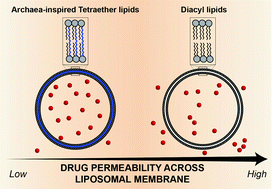Characterization of drug encapsulation and retention in archaea-inspired tetraether liposomes†
Abstract
The passive leakage of small molecules across membranes is a major limitation of liposomal drug formulations. Here, we evaluate the leakage of 3 clinically used chemotherapeutic agents (cytarabine, methotrexate and vincristine) encapsulated in liposomes comprised of a synthetic, archaea-inspired, membrane-spanning tetraether lipid. Liposomes comprised of the pure tetraether lipid exhibited superior retention of both a neutrally and positively charged drug (up to an ∼9-fold decrease in the rate of drug leakage) compared to liposomes formed from a commercial diacyl lipid, while exhibiting a similar retention of a negatively charged drug that did not appreciably leak from either type of liposome. We also demonstrate that liposomes made of the archaea-inspired lipid can be used for the delivery of encapsulated small molecules into living cells.



 Please wait while we load your content...
Please wait while we load your content...